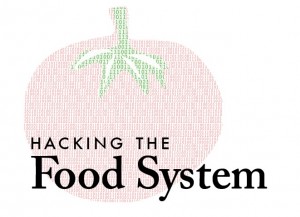[Due to the overwhelming response to our series Hacking the Food System, Food+Tech Connect will be continuing the conversation each Wednesday with a new post from a thought leader in the field. Read past posts exploring how technology, information and data can change the food system status quo and follow along as the conversation continues on Twitter (hashtag #foodtech), or Facebook.]
 My focus has mainly been on solutions that try to pull some larger “levers of change” in the food system. The industry is in such a bad state right now, and it’s so incredibly complex with many, disparate players. Different types of technology can definitely help, but I think the million dollar question is where and how….and who can and should fund it.
My focus has mainly been on solutions that try to pull some larger “levers of change” in the food system. The industry is in such a bad state right now, and it’s so incredibly complex with many, disparate players. Different types of technology can definitely help, but I think the million dollar question is where and how….and who can and should fund it.
Lately I’ve been talking with some funders and investment advisors who are researching the most promising tech investments. Short answer: it’s hard to know for sure, and, in my opinion, the state of the industry requires a lot more systemic thinking about solutions than just tech tools on their own.
Nonetheless below would be my quick picks. I’m sure there are other areas that could benefit greatly from technology, but these stand out to me as potentially having the largest impact:
- Precision agriculture: hardware and software to help farms increase their efficiencies. There is a lot of opportunity here. Precision ag is not only for agribusiness and not only for chemicals. There is a lot of research and innovation emerging to allow smaller farms to monitor, irrigate, and manage their land more efficiently and cheaply.
- Water metering, sensing and allocation tools: both hardware and software, and for both municipalities and farmers directly.
- Traceabililty tools, sensors, and anything to support the (hopeful) upcoming Produce Traceability Initiative.
- Anything that helps farm operations “do more with less”: helping them increase their efficiencies with their notoriously limited resources. Many economic and distribution issues downstream in the supply chain are initially caused by the unviable operations on the farm.
- [The elusive] Business-to-business regional supply chain transaction management and demand-supply alignment tools. Almost 99% of food sales are b-to-b. We need solutions to bring a lot more regional foods into these mainstream channels. Unfortunately, this is much easier said than done. (Check out the “Building Regional Produce Supply Chains” white paper we released with FarmsReach this summer.)
- Aquaponics in certain situations, especially where there is not enough soil, water or other resources to grow food on the land.
- Food stamp processing and innovation. Disclaimer: this isn’t my area of expertise at all(!), but I do know there is a need for 1) more markets and farmers markets to be able to process food stamps, and 2) it seems there must be an opportunity for innovation here.
- Anything that could help disseminate business planning and financial management skills to the millions of family farms in the U.S. as well as to many of the thousands of non-profit organizations trying to help them.
- Anything to entice more people to cook and actually help them do it.
- Pipe dream: An online Cliff Notes version of the Farm Bill legislation, including searchable index, map of where the money flows now, and links to pertinent legislators and contact people associated with each bill.
____________
Melanie Cheng is the founder of nonprofit Om Organics. Operated the first farmers market-to-restaurant co-op in San Francisco in 2002. Developed the OmOrganics.org website, which is still the primary resource to learn about organic agriculture and find sustainably grown foods in the SF Bay Area. Their most recent project Catalyst Commons is an evolving initiative to help the food system movement make a bigger impact, sooner: efforts to minimize duplication of effort and connecting those with capital with those who need it.
Founder of for-profit FarmsReach.com, initially a web-based SaaS platform to facilitate regional food distribution, primarily connecting producers with wholesale buyers. Developed and hosted Produce Supply Chain Convening in 2010, bringing together leaders along the vertical to pinpoint critical obstacles to scale sustainable food systems. Released the “Building Regional Produce Supply Chains” white paper in 2011, outlining industry obstacles and opportunities.
Curator and developer of Food Systems track at the international Social Capital Markets conference in 2010. Previously, a Cisco Systems writer and editor.



